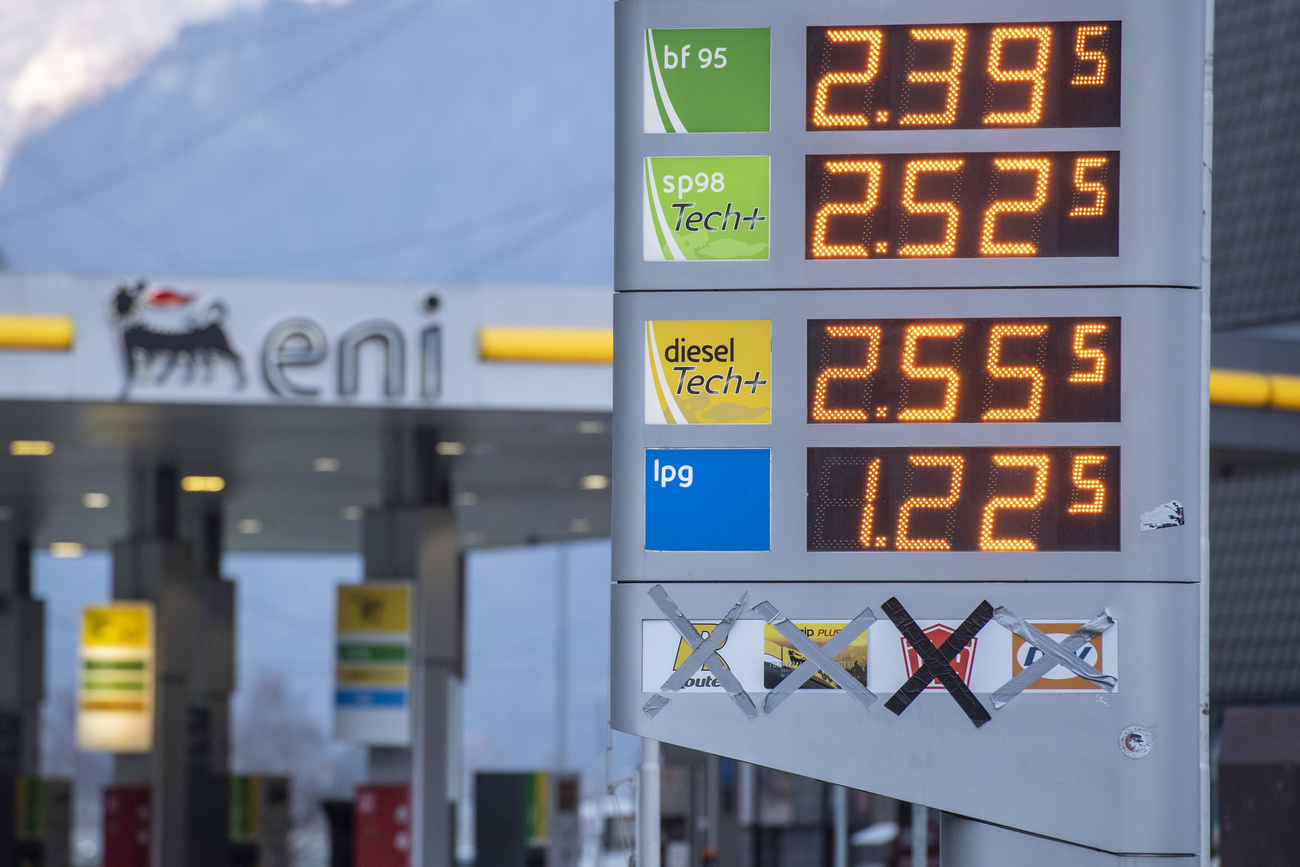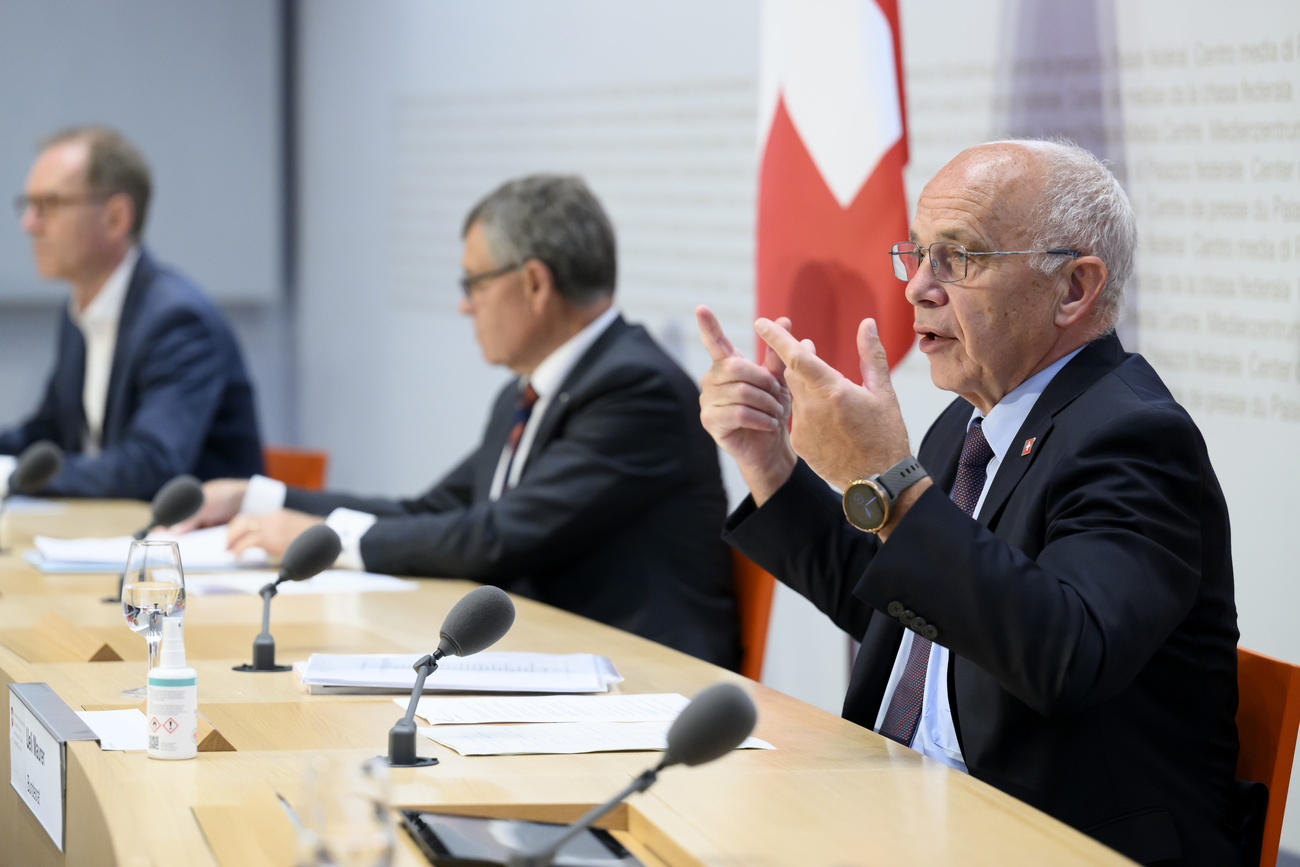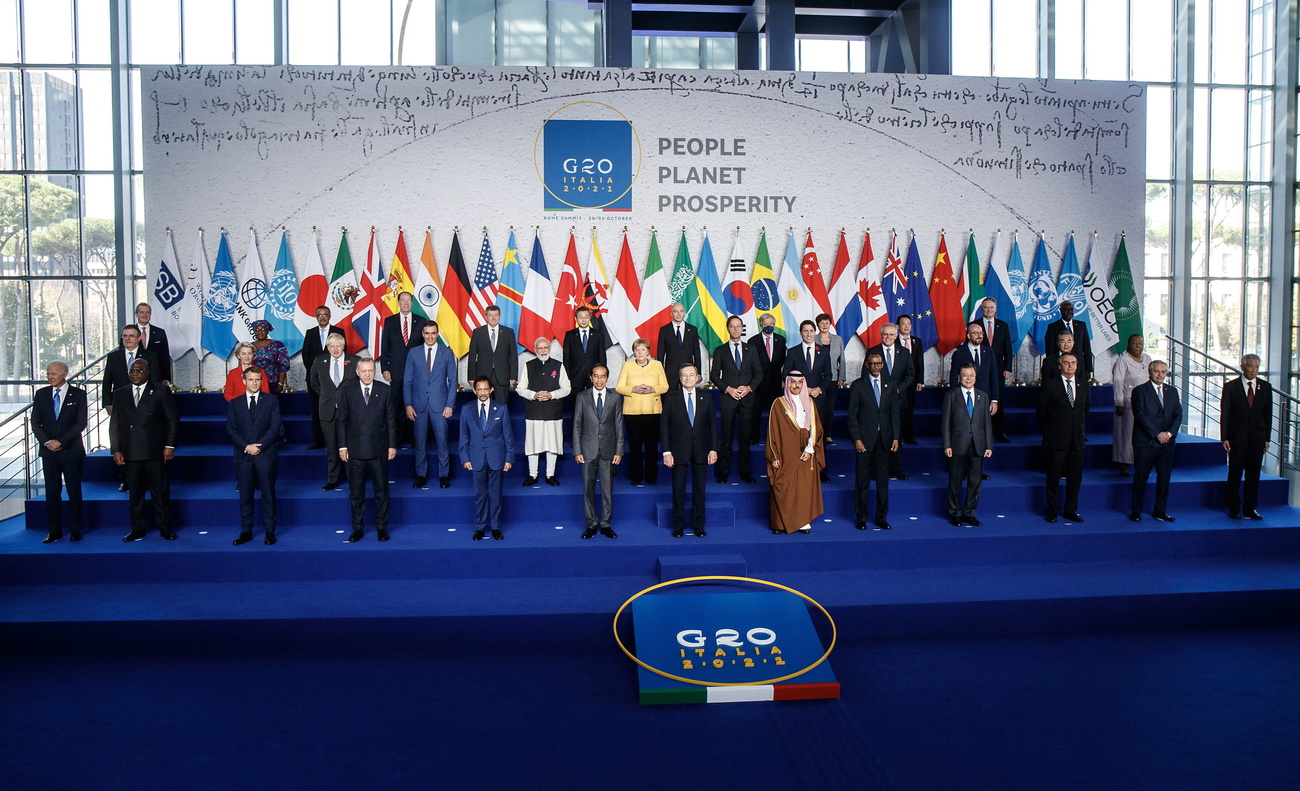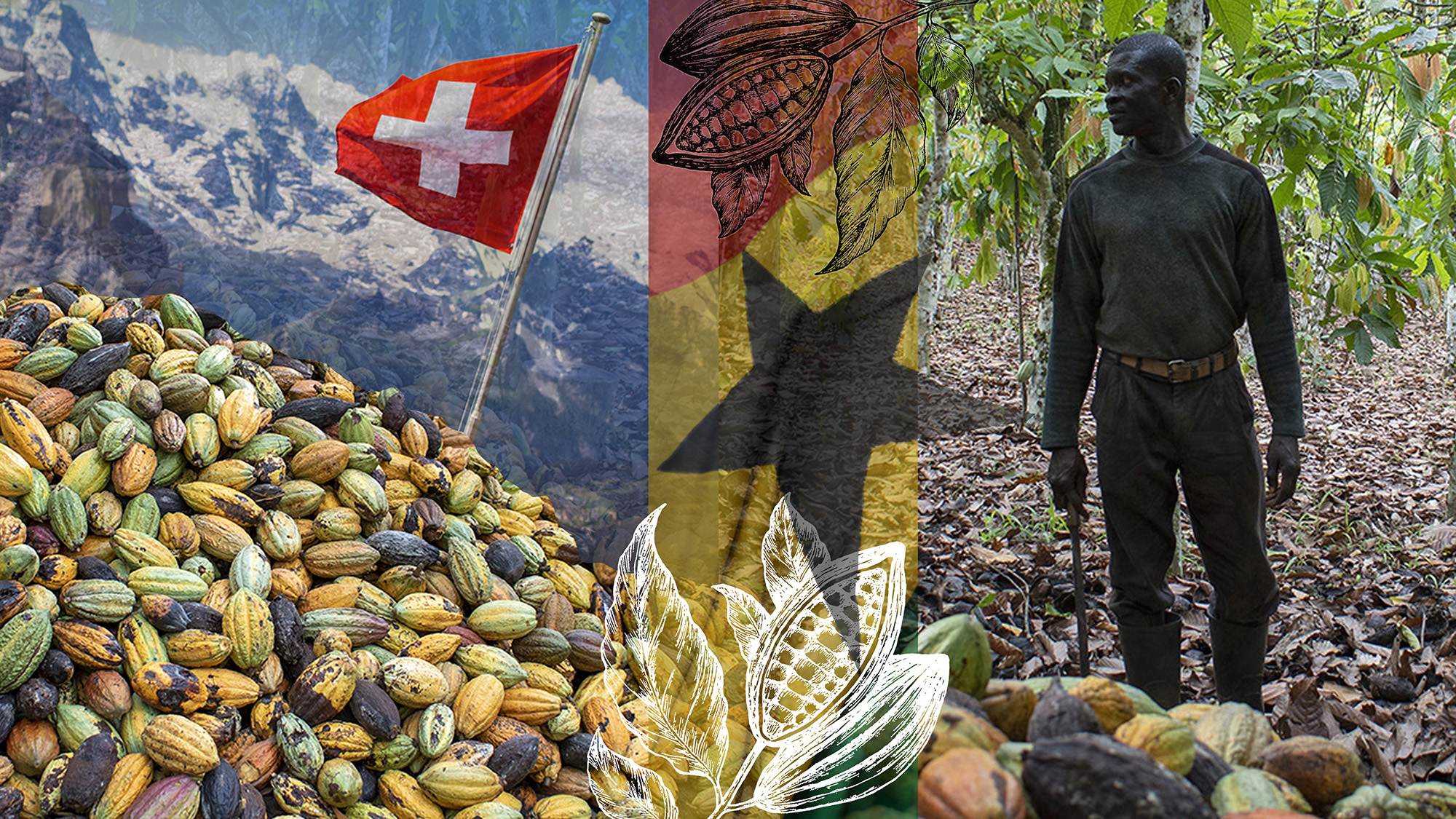Should governments tax companies that profit from the war?

Proposals to tax companies that generate huge financial gains on the back of the war in Ukraine are gaining momentum in many countries, including Switzerland. While there’s a strong moral justification for such a windfall tax, some economists are sceptical of its benefits.
In early August United Nations Secretary General António Guterres called for a one-off tax on companies that have benefited from rising prices due to the war in Ukraine.
“It is immoral for oil and gas companies to be making record profits from this energy crisis on the backs of the poorest people and communities, at a massive cost to the climate,” Guterres toldExternal link reporters. “I urge all governments to tax these excessive profits, and use the funds to support the most vulnerable people through these difficult times.”
Guterres isn’t alone in advocating a windfall tax. Several governments such as Italy and Spain have already introduced such a tax and many others like Switzerland have political campaigns calling for a so-called windfall tax. This will fill government coffers reeling with pandemic-era debt and help cushion the blow of higher fuel and food prices on households.
While the proposals sound good in theory, some economists caution there could be unintended consequences for the people the taxes are intended to help.
What’s the debate about? An explainer.
What is a windfall tax?
A windfall tax is a one-time surtaxExternal link levied on a company or industry that generates large and unexpected profits – also known as windfall profits – due to market conditions for which they are not responsible. There is no single way to implement a windfall tax. It could be a levy or set tax rate on profits above a certain level or an export duty.
Why is it under discussion now?
Many companies, specifically in the energy and commodities sector, are making more money after sanctions and Russia cutting off the gas supply caused prices to soar. Several companies have seen record profits, including many commodity traders in Switzerland. Energy trader Gunvor’s net income after tax nearly quadrupled to $841 million (CHF801 million) in the first six months of this year, compared with the same period a year earlier.
Meanwhile, rising prices on fuel and food are hitting the poorest the hardest as many struggle to pay to heat their homes, cook food and keep the lights on. The World Food Programme estimates that the ripple effects of the war in Ukraine will cause 47 million more people to fall into extreme hunger by the end of the year.

More
Critics target government’s planned OECD tax reform
Some NGOs such as Oxfam as well as politicians have raised the idea of a tax as a way to redistribute money and help people most impacted by the consequences of the war.
“This is a very obvious moment for a windfall tax because you have an industry which is making what are clearly supernormal profits at a time when the ordinary people who are the consumers of that industry are facing very high costs,” Alex Cobham, chief executive of the Tax Justice Network, told German media Deutsche WelleExternal link.
Prior to the war, there was talk of taxing some of the companies such as mask providers and vaccine manufacturers. The director of the KOF Swiss Economic Institute suggested in a 2020 interviewExternal link that the winners of the pandemic such as food retailers, online shops and pharmaceutical companies should be taxed more heavily.
Has it ever been used?
There are several examples of such a one-off tax throughout history. According to the Tax Foundation, an independent tax policy NGO based in the United States, the idea emerged as early as 1915 when Denmark and Sweden introduced what became known as a “stew tax”, which was a one-off tax on companies exporting food to Germany.
The US introduced an excess profits tax in the First and Second World Wars – and again in 1980 after the oil shock. The United Kingdom also introduced a windfall tax during the First World War and then again in 1981 when the government taxed banks that benefited from high interest rates. In 1997, the UK also launched a tax on companies in industries that had been privatised.
Other countries have also tested windfall taxes. MongoliaExternal link implemented a taxation on the profits made by mining companies operating there in 2006. It repealed the tax in 2009.
What do the current proposals for a windfall tax look like?
Several countries have introduced a form of windfall tax that would replenish government budgets and support people affected by both the war and the pandemic.
In March the European CommissionExternal link called on member states to consider temporary tax measures on windfall profits to offset higher energy bills. The Organisation for Economic Co-operation and DevelopmentExternal link has also suggested that a windfall profit tax could be used to help relieve households from the impact of inflation.
In May the UK introduced a 25% energy profits levyExternal link on “the extraordinary profits the oil and gas sector is making”. This is expected to raise around £5 billion (CHF5.7 billion) over the next year which the UK government says will “go towards supporting people with the new cost of living measure”.

More
Global corporate tax deal reshapes how Switzerland attracts multinationals
Italy, Romania, Spain and Greece have all introduced some kind of windfall tax, largely on the energy sector. Italy expects to raise €11 billion (CHF10.65 billion) from a one-off 25% tax on energy companies. The Dutch government said it would slash the VATExternal link rate on energy while cutting excise taxes on gasoline and diesel.
Uganda’s government passed a windfall taxExternal link in December that would apply to oil companies’ income whenever the price per barrel rises above $75. India also introduced a windfall tax in the form of an export tax on domestic oil producers but reduced it 20 days later after oil prices fell.
Discussions are ongoing in several other countries including the US, Germany and Switzerland, but there’s more political resistance.
Germany’s finance minister rejected the idea of a windfall tax in mid-August, saying it would disrupt market forces. Swiss politicians from left-wing and centre parties are campaigningExternal link for a windfall tax targeting the commodity sector that is likely to be discussed in parliament in September. The Swiss government has rejectedExternal link the idea up to now, arguing it isn’t possible to separate normal profit and war or crisis-related “excess profit” and that there’s no provision in tax law for industry-specific taxes.
Why is it controversial?
Windfall taxes are despised by industry. They see it as an arbitrary tax that fuels uncertainty about future taxes and distorts investment incentives.
Some economists are also sceptical of such plans. “How do you separate out good from bad profits?” asked Mark Schelker, who chairs the public economics department at the University of Fribourg. “What if solar energy was highly profitable? Would we consider taxing it as well? This can be a slippery slope.”
There’s also the practical challenge of separating out normal profit from “excess profit” that is the result of a war or crisis.
Daniel Bunn from the Tax Foundation told SWI swissinfo.ch that if a country designs its corporate tax base correctly, it should capture windfalls as they arise without a special tool. Profits are already taxed, and there are a few Swiss cantonsExternal link that have progressive tax rates, which means higher profits are taxed at a higher rate. Switzerland is among many countries that also allow companies to carry forward losses for up to seven years, which lowers taxable income. Eliminating certain write-offs or share buybacks that reduce the tax base are also a way to ensure profits are fully taxed.
There’s also no guarantee that tax revenue will benefit the people who need it most. That depends on how governments spend tax revenue. Economists like Schelker also worry that companies will end up passing the higher tax payment on to consumers in the form of higher fuel prices.
For supporters of such a tax, the current crisis is an exceptional situation that requires exceptional measures. By some estimatesExternal link, a windfall tax of 90% on the excess profits globally would yield about $490 billion that could be used to avert famine for millions of people. “In 2022, to have a food crisis of the level that we have is not morally acceptable, and we all need to take responsibility and act,” saidExternal link Gabriela Bucher, executive director of Oxfam.

In compliance with the JTI standards
More: SWI swissinfo.ch certified by the Journalism Trust Initiative




You can find an overview of ongoing debates with our journalists here. Please join us!
If you want to start a conversation about a topic raised in this article or want to report factual errors, email us at english@swissinfo.ch.